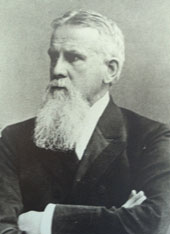Friedrich Ratzel
| Friedrich Ratzel | |
|---|---|
 |
|
| Born |
August 30, 1844 Karlsruhe, Baden |
| Died | August 9, 1904 (aged 59) Ammerland, Lower Saxony |
| Nationality | German |
| Fields |
Geography Ethnography |
| Institutions | Leipzig University |
| Education |
University of Heidelberg University of Jena Humboldt University of Berlin |
| Influences |
Charles Darwin Ernst Haeckel |
| Influenced | Ellen Churchill Semple |
Friedrich Ratzel (August 30, 1844 – August 9, 1904) was a German geographer and ethnographer, notable for first using the term Lebensraum ("living space") in the sense that the National Socialists later would.
Ratzel's father was the head of the household staff of the Grand Duke of Baden. He attended high school in Karlsruhe for six years before being apprenticed at age 15 to apothecaries . In 1863, he went to Rapperswil on the Lake of Zurich, Switzerland, where he began to study the classics. After a further year as an apothecary at Moers near Krefeld in the Ruhr area (1865–1866), he spent a short time at the high school in Karlsruhe and became a student of zoology at the universities of Heidelberg, Jena and Berlin, finishing in 1868. He studied zoology in 1869, publishing Sein und Werden der organischen Welt on Darwin.
After the completion of his schooling, Ratzel began a period of travels that saw him transform from zoologist/biologist to geographer. He began field work in the Mediterranean, writing letters of his experiences. These letters led to a job as a traveling reporter for the Kölnische Zeitung ("Cologne Journal"), which provided him the means for further travel. Ratzel embarked on several expeditions, the lengthiest and most important being his 1874-1875 trip to North America, Cuba, and Mexico. This trip was a turning point in Ratzel’s career. He studied the influence of people of German origin in America, especially in the Midwest, as well as other ethnic groups in North America.
...
Wikipedia
